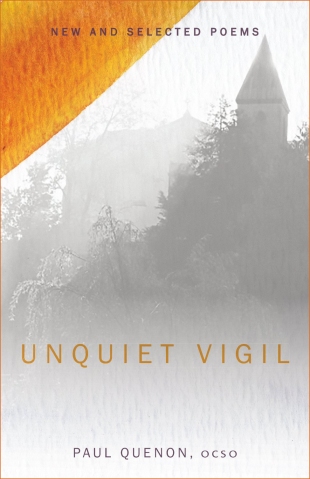Vigil-keeping is an ancient Christian practice handed down through the generations as one way of dealing with troublesome patches of difficulty, doubt, depression, uncertainty, and waiting. This sturdy spiritual path is more relevant than ever but not many believers are familiar with its intentional aim to abide, trust, and embrace the darkness while looking for the light. Hard times and the challenge of overcoming obstacles both enable us to discern the loving presence of God and be tutored in the art of active waiting.
These benefits come to mind while reading Paul Quenon’s author note in Unquiet Vigil:
"The monastic life is a lifelong practice of both watching and listening. After 55 years at this I am still a beginner. My vigils are difficult, my listening partial. . . . These poems are a circling around silence to see and watch what is heard, a use of words to fix in hearing what is not quite seen. Writing has been for me, in a broad sense, a way of vigil-keeping, of making the watch something more of my own."
The poems in this stellar collection of contemplative gems are arranged into thematic sections on Bells of the Hours, Afternoons with Emily, Monkswear, Laughter My Purgatory, and Terrors of Paradise.
On the spiritual discipline of watching, we were especially moved by Brother Quenon’s reverence for little birds "who come in plain jackets" and sing "so extravagantly." We were touched by a poem where the author pays tribute to Jesus for having "such exquisite care / not to disturb the surface of water / that he could walk on it."
And we loved the poet’s appreciation of "the ever-dutiful door groans / with world weariness, / behind me closing / slows and thumps to / conclusion." We are grateful to Brother Quenon for "Primal Prayer" where he mourns the death of children in Bagdad as the bombs fall; he laments, "Only the infant wail / is truth."
Born in West Virginia, Br. Paul Quenon entered the Trappists in 1958 at the Abbey of Gethsemani in Kentucky, where Thomas Merton was his novice master. He has been publishing poems and photographs for the last quarter century. He still lives as a monk at Gethsemani.
